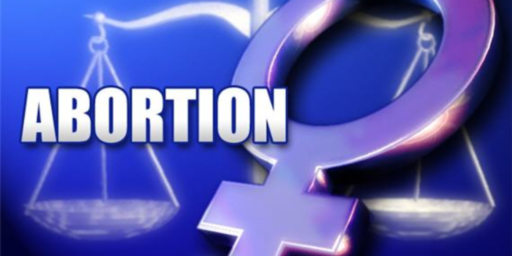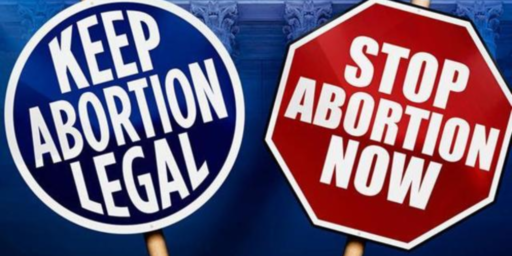Time for a New Party?
Mark Tapscott thinks the combination of historically low poll numbers for President Bush and the drop in Congressional job approval to a mere 27% may signal that the public is finally fed up with “business as usual.”
In other words, the moment may be approaching for an independent, trans-partisan political party, a citizens party if you will, to assume the initiative. Or maybe no such movement will appear and instead the current system will simply continue and the nation will continue its current slide towards the entitlement culture’s inevitable economic bankruptcy.
For reasons I’ve enumerated numerous times, including an August 2006 article for TCS Daily, the emergence of a successful third party is incredibly unlikely.
Ultimately, if the public sustains its hostility to specific problems in the system, some candidate or one of the existing parties will exploit that to help get elected. The two parties have demonstrated time and again that they will adapt to the changing demands of the voters.
Whether that’s a good thing is, of course, debatable.
UPDATE: Steven Taylor and Matthew Shugart, both of whom specialize in the politics of voting, have more thoughts on the feasibility of overturning the two party power structure. Neither are sanguine about the odds.
Shugart nonetheless advises charging forward:
I can’t name one case in which major change away from single-seat districts to a more representative and democratic electoral system ever occurred without the rise of new parties first. So, my advice to people who feel it is time for a new party is simple: Find one and participate in and vote for it.
I’ll likely continue to pick the least bad option among the major candidates, though, unless I ever find myself back in a state where the outcome is preordained.





I don’t doubt that we’ll get a new political party, but I don’t think it’s going to get a new name. The Democratic party is practically a different party than it used to be (with a few holdovers), why won’t the Republican party become a new entity under the old banner?
We’ve already got that. Democrats, Republicans and Progressives…..just sayin’.
An existential question, really, but that’s about right. The parties seldom reinvent themselves in one cycle but they certainly evolve into something unrecognizable over time.
I think a new party is a great idea. It can live in a universe untroubled by all the difficulties and frailties of human nature which have driven Republicans and Democrats into the positions they now find themselves. Maybe they can’t get permission from Proctor and Gamble to call their product new and improved! So, which bus do I take to get there as well?
I’m not Panglossian by any stretch, but why should anyone expect that a fresh coat of paint, a rebranding, or a new manifesto will suddenly give us a different result when thrown into the same briar patch of domestic politics, international intrigue, economic populism, nascent isolationism, and technological change advancing faster than society can cope? The forces arrayed against idealism (any idealism) are damned strong and wickedly resilient. The problems rest with the people. It is the people who keep electing folks like Trent Lott and Harry Reid. Any real, lasting solution must address the deficiencies in the choices exercized by the electorate or else we’ll just keep seeing snippets of a song by The Who over and over and over. And since I’m stuck once again on cliches, Lord Acton nailed the real problem long ago in his oft-quoted aphorism about power, which, as usually interpreted, is really a corollary to Thomas Paine’s statement concerning the inverse relationship between the quality and the quantity of government.
But I digress.
I submit that we already have a one party system; the republicans have spent the last fifteen years leaning left so much that the differences between the democrats and republicans are now nearly indistinguishable. Witness the recent move toward this monstrosity of an immigration policy.
I submit that the amount of anger coming from the electorate is directly related to how leftist the current power structure is. If you track the polling data , versus the positions taken by the politicians and power regardless of party, you’ll notice that the further left they lean, the angrier the electorate gets. A quick look at Harry Reid’s numbers… what, 19%? are a clue to this.
The solution, is not a third party. The solution is to get republicans to start acting like republicans.
Look, even France, after so many years of socialism, is swinging to the right. We could do the same thing if we actually had politicians who stood up for those values. It’s my judgment that the American people in majority long to do precisely that. What needs to happen is that the republican party needs to swing to the right, and unload the republicans in name them only like McCain and so on.
Drop in congressional approval? What drop?
According to pollster.com their approval has only risen since the elections.
http://www.pollster.com/ACongApprovalCurrent380.png
Look at the RealClear Politics data going back through last March. There was a significant uptick after the election and when the new Congress came into office. The numbers are now down below the pre-election low.
I trust pollster more. They do an excellent job of vetting the data used. They also use a very good regression method to determine the average and put it all in a table.
I don’t see a table but I’ve gone to the site and looked at Charles Franklin’s article. He acknowledges that the LAT/Bloomberg poll is excellent and this is indeed the lowest Congressional approval in the last ten years of that poll, that approval is trending down, and that it’s around 30%.
His point is really just a quibble: Aggregating all polls, this isn’t the lowest point.
Then again, I never said it was, merely that it had dropped to 27% in the linked poll. Which, of course, it had.
whoops, in the article you linked to Prof Franklin has an updated version of the congressional approval chart and it *does* show a down tick at the end.
My bad!